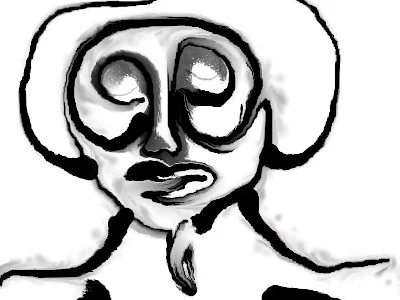another goddamn poem / meeting
here's a black box,
with a rosemåling
scene of parallel
environments crashing
and burning on a street
in town. trying
to get my systems
back on line. are you gaining
ground on your project, dude?
(we turn 72 hours
into 5 weeks)
perception presents
swimming with dolphins
in their moment of ordinariness
we witness only magic
as the waves call their lines
moving in rhythm of the soul
which is never too old but always ancestral
as your corner of the universe calls to you
to see what may be there
present in the moment of the step
shadowed by the fading lights of what was
that which i flew past just to get to the corner
for just a peak, a sneak peak if you will ...
to find out if it was all that it promised.
and, sure enough, it was!
another beach
with another corner
and i looked down as the waves
wiped out the footprints of my path
and i walked on once more
through another door.
peace & harmony,
elaine
'freedom must be exercised to stay in shape!'
poem
scurry act gulp croon
crystal cyst
farrago octopus stalk agony gulf
clinging sport scrawl around loop pools · ink
actual drool · by usual stall
banzu · all scrying sylvan aspics that if
getting the nod
that tome carrying contraption formerly known as memory
treats conviction like a bad case of the grey-areas
and it all hinges on a not-on-your-nellyism belief
that some things just won’t wash
…well, we’ve all heard stories of forgetting
but when you get the nod from amnesia
it really is time to give recollection the slip
and head straight for the
Patios Furniture
They seem to have a reaching-back or away-from as characteristics of there systematic, to a plane or horizon not immediate or attainable from conscious mediation. Self-reflection would appear to involve a looking back-over or away from the immediateness of perception or conscious cogitation. Only by pulling away, or in Schopenhauerian terms, disinterestedness, can we be said to be truly self-reflecting. Husserl’s self-reflective transcendental-ego does just this, a Cartesian self-reflection that does not do away with the world, but accepts it as given, in existence always. But first let us go to the Freudian unconscious, the source of much perplexity and conjecture.
The unconscious is there if we look for and acknowledge these proofs and signs, which are to be found in symptoms, forgetfulness, i.e. repression, slips of the tongue, repetitions and so forth. The unconscious, or primary process, is that part of the psyche that is hidden, or concealed, until drawn out, be that through interpretation, translation or free-association. Ricoeur for example, conceived of the unconscious as a hermeneutics, a language of symbols and representations. Lacan defined the unconscious as a language, a structural assemblage of meaning found in the interpretation of unconscious patios.
Shorts Are Wrong
the “Will-to-Death” doesn’t know its own name’s etymology
look the moral compass in the face:
you’ve been a bad boy.
you’ve been an evil-doer.
the Noseless One sure knows how to live it up.
there’s no mirror left in this room.
how my palms sweat, how the hairs on my arm rise
how there is no sound and yet your voice.
you do evil and it feels so damn good.
evil is itself an abstraction, a strategy, like terrorism.
heaving corpses over the pit’s edge—who said this was going to be a party?
still, my curiosity is piqued.
death is the ultimate evil, I guess.
when you have killed the world with all this “evil” you keep spouting.
overacting is what some critics might call it.
overreacting is more apt, at least in a work of fiction.
death is all you can threaten? obliteration?
who cares about something so unfashionable and tame anymore?
death, you’ve lost your sting: mortality, you’re lost in the wilderness.
it should be a moral question, and I should care.
does it make a person heartless to remain unvexed?
the will-to-death as the ultimate evil? come on, there’s more to it.
call me a Jew with a bag on my shoulder full of stones and lies.
there’s nothing more or less human than dying.
avoid the inevitable by witnessing the “evil” of death.
clinging to illusion is every Jewish Buddhist’s ex-pat role in Dharamsala.
it reaches an end, everything, entropy or annihilation or some other term.
this is where evil takes us? why invest such powers in a concept?
not even a good extended metaphor: where’s the poetry, even?
why ever would you want to be evil?











